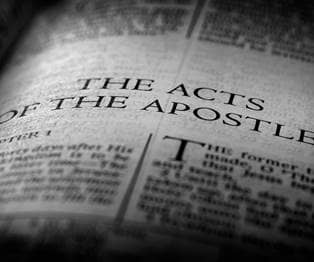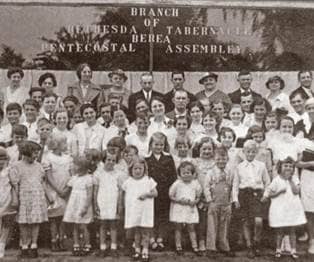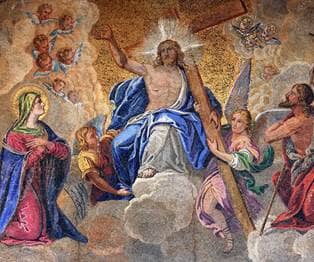- Trending:
- Pope Leo Xiv
- |
- Israel
- |
- Trump
- |
- Social Justice
- |
- Peace
- |
- Love
Pentecostal Beliefs
Sacred Narratives
Pentecostals, like other Christians, adhere to the biblical narratives as inspired texts. As such, Pentecostals have focused on several of these narratives in particular to help make sense of their religious world, a world that is filled with supernatural activity in contexts that range from the most mundane to the most transcendent. The Book of Acts has traditionally been a blueprint for the Pentecostal experience. Other foundational scriptures include Paul's first Letter to the Corinthians, especially chapters 12-13 where the gifts are discussed, and some sections of the Hebrew Bible, like Joel 2: 28-29.
More than other Christians though, Pentecostals focus on the making of what can be called "spiritual life stories" as a way to corroborate the biblical sacred narrative. Such testimonies take on a sacred nature because they are stories told and re-told to validate the ongoing active work of the Holy Spirit in the world. As such, even though many Pentecostals might not view testimonies as "sacred," they function in Pentecostal communities in ways that are similar to the way that the Bible functions for the community. This is not to suggest that testimonies supersede the Bible as the source of religious authority, since testimonies need to be judged based on their agreement with the Bible. It does, however, mean that these narratives have their own spiritual authority and thereby can become part of the canons that Pentecostals view as sacred.
Among the most common forms of testimonies in Pentecostalism are the following: conversion, Spirit baptism, healing, and "signs and wonders." Conversion testimonies are intended to promote the idea that one has come to some understanding of the truth, and is thus somehow different-spiritually transformed-than before conversion to faith in Christ. The testimony usually is marked by a pre-conversion story and a post-conversion story. The more harrowing the story, the more emotional and therefore lasting the impact the story has on the community. The testimonies that garner the most emotional reaction are often the conversion stories that offer a supernatural deliverance from the depths of socially and physically destructive behavior; these are often the stories of those who were in prison, former substance abusers, gang members, and so on. They are told to different audiences with the intent that the testimony serve as an entry way by which God can work through the speaker to "soften the heart" of a listener and allow the Holy Spirit to change that person's heart and mind, leading to the individual's conversion and adding to the ongoing process of creating testimonies.
Testimonies of Spirit baptism function a bit differently than those of conversion. Spirit baptism narratives are intended to sacralize the practice by which most people become Pentecostal. What is different in this type of testimonies is that since this practice demands an immediate response, they are usually offered when there will be prayers for people to receive Spirit baptism. This baptism becomes evident in speaking in tongues. These testimonies assure listeners that Spirit baptism is possible, and that it is a good experience that they too can have if they pray for it and allow the Holy Spirit to work. If someone responds and speaks in tongues-as is often the case in such testimonies-that person now becomes part of the ongoing narrative, assuring that others will hear a similar story and assuaging the doubts and fears of both fellow congregants and visitors, who may view the practice with suspicion.
Probably no sacred narrative is more prized in the Pentecostal world than the testimony of healing. Physical healing, provided for in the atonement, is expected and anticipated. As such, it is celebrated and reiterated. Such stories, from their recordings in the early Pentecostal magazines through today's testimony in many churches, share many similar characteristics and, overwhelmingly, follow a biblical script that adds sacrality to the narrative. Because one of the key elements of Pentecostal theology is the belief that the ongoing supernatural work of God exists as an unbroken continuum, healing solidifies today's Pentecostals in their spiritual lineage, connecting them to the biblical times as no other narrative can.
Healing narratives, aside from proving the beneficence of God, demonstrate that there is an ongoing relationship between the Divine and humanity. Early Pentecostal magazines chronicled physical healing almost exclusively, especially relating accounts of occasional bouts of "neurasthenia" (nervous exhaustion, or mental fatigue) being cured. As Pentecostalism's focus on healing broadened from physical to mental and later emotional ills, the narratives attached to these types of healing were imbued with the same kind of energy as physical healing. Someone being healed of depression, or being healed even of low self-esteem, often garner the same emotional response as someone being healed of back pain.
Certainly dynamic stories of people being completely healed from terminal illnesses trump virtually any other kind of healing narrative, but Pentecostals have found ways to harness all of these narratives to create "spiritual life stories." These healing narratives function in much the same way as other oral genres, as stories with certain characteristics, structures, and content that make them familiar. These narratives are deployed to create a sense of holiness and power, to impart a sacred view of a world where God is always active, in all sorts of ways-from the most minor, such as finding lost luggage, to the most magnificent, such as healing terminal cancer. Pentecostalism holds that God cares about all of it and has a close, deeply personal relationship with humanity. These narratives celebrate the sacred nature of that ongoing relationship.
Ultimate Reality and Divine Beings
Pentecostals are biblical literalists; in their reading of the Bible, God exists, has always existed, and always will. God created all things (some Pentecostals adhere to the six-day creation narrative) and yet humanity rebelled; because of the stain of original sin, God has made a way to reconcile humanity through the sacrifice of Jesus, who is God incarnated in human form. Belief in Jesus then becomes the only way that one can truly understand what "ultimate reality" is, and how one can be removed from the alternative to that reality, which is a life under the influence of Satan. The Holy Spirit is viewed as emanating from God and operating in peoples' lives under the direction of God.
Pentecostals believe in the reality of Satan as a fallen angel, who is viewed as the source of all evil in the world. They also believe in demons and angels. Angels serve a different role than they do in Catholicism, for example. There are guardian angels, but personalizing a particular angel (unless they are specifically named in the Bible) is not normative practice. Angels do play a role, however. Historically, angels appear in similar ways as they do in the Bible. For example, Charles Parham had a vision that God was sending a guardian angel to protect the U.S., which apparently had a role to play in Parham's view of the end times. Many of the key Pentecostal leaders have had angelic visions.
The problem of angels vexes Pentecostals, as this example of the Assemblies of God demonstrates. For the Assemblies, these ministering spirits play a very different role than they do in the popular religious imagination, which often portrays them as independent agents. What precipitated this doctrinal statement clarifying the role of angels was a healing revival that took place in 2008 in Lakeland, Florida, where a Canadian evangelist, Todd Bentley, was said to have mentioned an angel named Emma as one of his ministering spirits. There is much to this report that troubled the Assemblies leadership, so much so that a public statement concerning angels became necessary. Naming an angel in such a way, as mentioned previously, strikes many Pentecostals as heterodox, since there is no mention of an angel Emma in the Bible. Furthermore, the Assemblies believe that there are no female angels. However, Pentecostal discomfort with angels stems mostly from a desire to keep folk religious practices and theological aberrations from gaining ground among the people and moving their churches away from evangelical Christianity.
Human Nature and the Purpose of Existence
Deviations from this theology come from two different venues: the Word of Faith movement and certain remnants of the "Latter Rain" movement. Word of Faith teachers, such as Kenneth Hagin and Charles Capps, have taught that the incarnation of Jesus granted humanity with a nearly perfect copy of God's nature. The Word of Faith leaders teach that by taking on the nature of Jesus, humanity can become perfect. Humans are not supposed to become ill and they will always prosper financially. These controversial views have, in the view of Word of Faith supporters, been greatly distorted and taken out of context by other Pentecostals, who charge that the idea that the nature of Jesus can become ours moves Word of Faith members uncomfortably close to the deification of humanity.
The "Latter Rain" movement (a post-World War II, anti-denominational phase in Pentecostal history), especially ideas promoted by William Branham and George Warnock, held that out of this new movement there would arise a group of leaders who would be so empowered by God that they would exhibit God-like powers. For example, Branham's exposition of this doctrine included the belief that he could pray things into existence, mimicking God's creative power. Warnock's contribution, a book called Feast of Tabernacles (1951), suggested that some believers-"manifest sons of God"-who had reached perfection in faith would not experience the terrible events mentioned in the Bible that will befall the Christian church in the end times. The larger Latter Rain movement has since splintered into various nondenominational churches and ministries with followers of Branham and Warnock splitting into separate groups and proponents of the "Manifest Sons of God" theology, a modified version of Warnock's ideas, have split into much smaller groups.
Pentecostals, like other Christians, believe that the purpose of existence is to worship God. They believe that God has created them for a purpose and so their lives are not random chance occurrences. Uncovering what the purpose is, making sure that they are guided correctly to that purpose, requires Pentecostals to utilize a variety of sources to help them with this process. Pentecostals engage in Bible reading and prayer in order to help discern what God's will is for their lives. Additionally, Pentecostals rely on the Holy Spirit's inspiration through praying in tongues, messages in tongues that are interpreted, and prophetic words that are meant to guide them toward God's purpose for them. All of these spiritual gifts and their results need to be interpreted through the lens of how they square with the Bible.
For example, one of the most utilized spiritual gifts for gaining insight into life is the word of knowledge, which, among many Pentecostals, has been conflated with prophecy. Words of knowledge are given to people who are in need of direction, seeking answers to often vexing questions, and are also for the purpose of encouraging people during trying times. In contemporary Pentecostalism, one way to find out God's purpose for your life is for another Pentecostal to offer you insight through a word of knowledge or wisdom. Words of wisdom are less frequently used for discerning God's purposes, but rather they are words given to adherents so that they can receive a deeper knowledge of what the Bible says about a particular issue affecting their lives. These are all viewed as prophetic words, though this kind of prophecy has nothing to do with forecasting events. It is akin to the biblical example of Jeremiah, whose prophetic words were often exhortations and warnings rather than foretelling the future.
Suffering and the Problem of Evil
Pentecostals are in a theological bind. To be consistent about the nature of the God they believe in, God cannot be the source of evil, so when good people suffer alternative explanations are needed. Pentecostals have a firm belief in the existence of evil and a clear theological picture of the source of evil. Satan is a real entity in Pentecostalism, as are his legion of demons that spend all of their time in an active pursuit of trying to undermine all of God's work.
While Pentecostals are loath to blame everything on Satan, there is a difference of opinion among Pentecostals over the nature of suffering. The questions surrounding theodicy (the role God plays or does not play in allowing evil in the world) are never easy to answer, and Pentecostal answers to this most vexing question of why God allows suffering, may strike some as too simplistic and unsatisfactory. These answers often perpetuate stereotypes about Pentecostals: that their penchant for hyper-spiritualizing and overly emotional responses have predisposed them to blaming demonic attacks for nearly everything that goes wrong in their lives. This answer is certainly too simple, and it should be noted that belief in ongoing demonic activity does not necessarily mean that Pentecostals do not struggle with theodicy. However, Pentecostalism also holds that humanity is involved in a cosmic battle, an active struggle between God and Satan.
Pentecostals do not believe that suffering and evil exist only in the mind. Pentecostals accept the reality of suffering, but often differ as to the author of suffering. Many hold that people suffer because God allows such things in order to build faith and character. The biblical teachings about trials and tribulations validate their own suffering, which is temporary, a test. Perseverance, Bible reading, prayer, fasting, and other spiritual practices are all a part of recovering from episodes of suffering.
That said, however, there is a sub-group of Pentecostals that does not accept the idea that God has anything to do with suffering at all; this group has a different interpretation of key biblical passages that suggest that God allows suffering. They point to the example of the thorn in Paul's side (2 Corinthians 12:7-10) stating that there is no biblical basis for assuming that God gave that thorn to Paul. The prominent Word of Faith teacher, Charles Capps, believes that a demonic messenger was responsible for this thorn, and that Pentecostals who use this famous passage as a way of blaming God for suffering as a necessary part of one's life are "religious" people: they have been deceived by "worldly" accounts of that passage, rather than just reading that passage by itself.
This alternative view of suffering among Pentecostals is especially pronounced among Word of Faith adherents. E. W. Kenyon (1867-1948), an early influence on the movement, posited the idea that Jesus' redemptive suffering took place largely on a spiritual plane, not a physical one. The result of such theological innovations is a doctrine called "Duel-Death," espoused by Kenyon and later by contemporary Word of Faith healer Kenneth Copeland. The "Duel Death" doctrine holds that upon Jesus' death, Satan seized him and breathed into him his own spirit, so that Jesus experienced the same spiritual death that befalls all humanity. Jesus was "born-again" in hell and then rose to heaven, thereby securing his exalted status as the resurrected Son of God. The importance of this doctrine is that there can be no evil, no suffering, that emanates from God. Such things are either the fault of people with no faith or demonic activity. For the Word of Faith movement in particular-and Pentecostalism in general, although the "Duel Death" doctrine is not accepted by all Pentecostals-God must be viewed as the person who gives us everything we ask for and is responsible for the abundant goodness of our lives, and never the source of diminished goods or expectations.
The devil exists for Pentecostals, as do his legion of demons. Demons can afflict Christians if they allow certain "doors to the demonic" to be opened. What usually opens the door for such demonic activity is moral laxity, the transgression of strict Pentecostalism standards for piety and sexual morality. On nearly every deliverance ministry website, there is a section that informs visitors that certain behaviors are more apt to stir the demonic into action-such things as "sexual sin" (usually adultery and homosexuality), occult activity (fortune-telling, palm reading, tarot cards, Ouiji boards), and sometimes even body piercings. Many deliverance ministries offer services for exorcism, while others offer such things as the anointing and consecrating of homes.
Pentecostals focus on exorcising demonic activity, no doubt because that is one of the biblical commands (Mark 16:17) that signals that a person has received the Holy Spirit. This focus on the demonic is especially true in global Pentecostalism, where the reality of evil activity is accepted as part of everyday life. Entire denominations in Latin America and Africa, especially, have been built on their ability to "cast out demons."
This specialization can have its own set of problems. The Universal Church of the Kingdom of God in Brazil, for instance, has reduced almost all of its congregational activity to the demons and spirits it will cast out during that particular day. Because the Universal Church is a hierarchy, only its approved pastors can exorcise demons, and the methods that they employ have come under scrutiny. Blending popular religion, folk Catholic practices, and Pentecostalism, the Universal Church makes use of objects such as rose petals, holy water, sanctified oil, bread, and tree branches, among other things to perform the exorcisms. These practices, among other perceived heterodox ideas, have placed the Universal Church outside the circle of orthodox Pentecostalism. The Universal Church as well as churches in Africa that allow blended worship using African rituals have been the most prominent groups that are illustrative of such hybridization.
Afterlife and Salvation
Most Pentecostals are eschatologically-oriented, meaning that they are awaiting the second coming of Jesus, which will be precipitated by a series of cataclysmic events. Many Pentecostals, like other conservative Christians, await the Rapture when they will be literally taken up in the air by Jesus and spared a time of great trial for those who remain on earth. Others believe that they will remain on earth to endure this interim time, the Tribulation. This refers to a period when Christians will rebel from the rule of the Antichrist and see fierce persecution before the second coming of Jesus. After the Tribulation concludes, Jesus will return to judge those who remain. There will then be a 1000-year reign of Jesus on earth before Jesus and Satan engage in the final battle, after which Satan will be banished forever. The world will then be destroyed and a "new heavens and new earth" created according to Revelation 21:1.
Great diversity exists in Pentecostalism over the minutia of the end times. There are full-fledged ministries dedicated to deciphering when the end times will begin. These ministries spend much time examining current events to see if they correspond to their reading of particular biblical passages. Many disagree over when the Tribulation begins and when it ends. There are many interpretations of key biblical references, such as "man of lawlessness" (2 Thessalonians 2:3), which is taken to mean the Antichrist. The Antichrist is also a matter of great debate-not the idea, but the identity of the person who will usher in the end times. Since many Pentecostals believe they will be spared the Tribulation and be taken up into heaven as described in 1 Thessalonians 4:17, they expect to be spared the worst of the end times, the floods, fires, earthquakes, disease, and unspeakable violence, that will occur before the second appearance of Jesus.
There are at least two different ideas about what occurs to a person upon receiving salvation after conversion. In keeping with the Wesleyan holiness roots of the faith, some Pentecostal groups-most prominently the Church of God, Cleveland, Tennessee, and the Church of God in Christ-adhere to the theological significance of sanctification as the second blessing after salvation, and the Baptism of the Holy Spirit as the third blessing. Other groups, notably the Assemblies of God and Church of the Foursquare Gospel, adhere to William Durham's early theological innovations-namely that salvation and sanctification occur at the same time. What adherents should be preparing for after salvation is Spirit baptism.
For some Oneness groups, who follow early leader G. T. Haywood's theology, salvation is linked to being baptized in the name of Jesus. God works all of salvation through one act, which is means that one can be saved, sanctified, and filled with the Holy Spirit all at the same time. To be fully saved, in Haywood's theology, one had to be baptized in the Holy Spirit, so that someone who confessed that Jesus was God and had not received Spirit Baptism was not completely saved until they had that experience. Not all Oneness groups adhere to this schema, but many would support variations of Haywood's initial offerings on Oneness salvation, which, of course, is very different from Trinitarian perspectives.
For other Pentecostals, salvation includes more than eternal life; it includes healing. F.F. Bosworth, a Depression-era evangelist, was one of many in the healing ministry who believed that healing was the visible proof of what some have called "spiritual salvation." Healing is the first step in the process of salvation. In other words, salvation is evident in the atoning work of Jesus, therefore, healing is a birthright for adherents. Most importantly then is the idea that some Pentecostals have made the exercise of spiritual gifts a key part of the salvation schema, an idea that places them outside the traditional Protestant idea that salvation is a free gift that requires no action.








